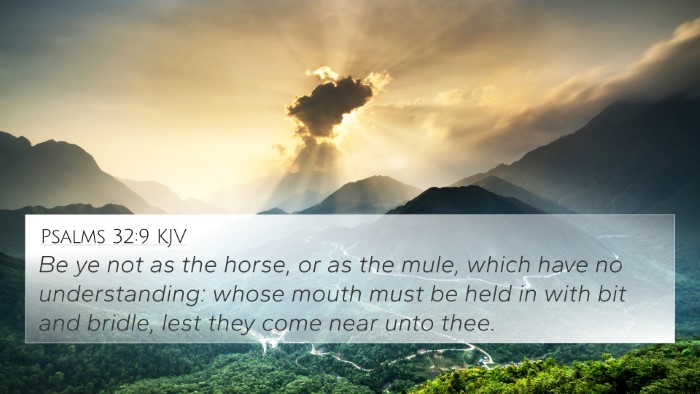Old Testament
Genesis Exodus Leviticus Numbers Deuteronomy Joshua Judges Ruth 1 Samuel 2 Samuel 1 Kings 2 Kings 1 Chronicles 2 Chronicles Ezra Nehemiah Esther Job Psalms Proverbs Ecclesiastes Song of Solomon Isaiah Jeremiah Lamentations Ezekiel Daniel Hosea Joel Amos Obadiah Jonah Micah Nahum Habakkuk Zephaniah Haggai Zechariah MalachiJames 3:3 Similar Verses
James 3:3 Cross References
Behold, we put bits in the horses' mouths, that they may obey us; and we turn about their whole body.
Uncover the Rich Themes and Topics of This Bible Verse
Listed below are the Bible themes associated with James 3:3. We invite you to explore each theme to gain deeper insights into the Scriptures.
James 3:3 Cross Reference Verses
This section features a detailed cross-reference designed to enrich your understanding of the Scriptures. Below, you will find carefully selected verses that echo the themes and teachings related to James 3:3 KJV. Click on any image to explore detailed analyses of related Bible verses and uncover deeper theological insights.

Psalms 32:9 (KJV) »
Be ye not as the horse, or as the mule, which have no understanding: whose mouth must be held in with bit and bridle, lest they come near unto thee.

Psalms 39:1 (KJV) »
I said, I will take heed to my ways, that I sin not with my tongue: I will keep my mouth with a bridle, while the wicked is before me.

James 1:26 (KJV) »
If any man among you seem to be religious, and bridleth not his tongue, but deceiveth his own heart, this man's religion is vain.

2 Kings 19:28 (KJV) »
Because thy rage against me and thy tumult is come up into mine ears, therefore I will put my hook in thy nose, and my bridle in thy lips, and I will turn thee back by the way by which thou camest.

Isaiah 37:29 (KJV) »
Because thy rage against me, and thy tumult, is come up into mine ears, therefore will I put my hook in thy nose, and my bridle in thy lips, and I will turn thee back by the way by which thou camest.
James 3:3 Verse Analysis and Similar Verses
Understanding James 3:3
James 3:3 reads, "If we put bits into the mouths of horses so that they obey us, we guide their whole bodies as well." This verse serves as a vivid illustration of how small instruments can control large entities, drawing a parallel to the power of the tongue in influencing behavior and direction.
Commentary Insights
Matthew Henry's Commentary emphasizes the significance of the tongue as a seemingly small but powerful part of the body. He draws connections between the bit that controls a horse and the way our speech can influence not just ourselves, but also others. Henry points out that just as reins guide a horse, our words have the potential to direct our actions and the actions of others.
Albert Barnes' Notes highlight the importance of control and discipline in speech. He explains that the bit represents a form of discipline that requires training and obedience. Barnes further indicates that the ability to control one’s speech reflects a greater ability to lead one's life and make ethical decisions.
Adam Clarke's Commentary points out the metaphor's dual implications, asserting that while the bit brings control, it can also lead to harshness if misused. Clarke discusses how the tongue’s capacity for both good and evil is akin to the potential of a bit—used well, it directs towards grace; misused, it leads towards chaos.
Cross-References
- Proverbs 18:21: "Death and life are in the power of the tongue..." - This verse affirms the significant impact of our words.
- Matthew 12:34: "...for out of the abundance of the heart the mouth speaks." - This highlights the connection between inner feelings and spoken words.
- 1 Peter 3:10: "For whoever desires to love life and see good days, let him keep his tongue from evil..." - The value of tongue control for a good life.
- Proverbs 21:23: "Whoever keeps his mouth and his tongue keeps himself out of trouble." - A warning about the dangers of careless speech.
- James 1:26: "If anyone thinks he is religious and does not bridle his tongue but deceives his heart, this person's religion is worthless." - Reinforces the necessity of controlling one's speech.
- Colossians 4:6: "Let your speech always be gracious, seasoned with salt..." - Encourages thoughtful and kind communication.
- Proverbs 15:1: "A soft answer turns away wrath, but a harsh word stirs up anger." - This illustrates the impact of gentle speech versus harshness.
Thematic Connections
This verse opens discussions about the broader themes of speech and communication within the Bible. From the wisdom literature of Proverbs to the practical teachings of the New Testament, the Bible consistently emphasizes the importance of thoughtful and controlled speech. Understanding these connections can enrich one’s study of biblical texts and their thematic relevance.
Cross-Referencing Bible Study
For those engaging in Bible cross-reference guide studies, James 3:3 serves as an excellent starting point. Here are some tools and methods to enhance your understanding:
- Bible Concordance: Use to find related verses and themes across the scriptures.
- Cross-Reference Bible Study: Study how multiple verses interact with the theme of speech and control.
- Identifying Connections: Explore Old Testament wisdom literature, like Proverbs, alongside New Testament teachings for a deeper thematic understanding.
- Comparative Bible Verse Analysis: Particularly effective in studying the parallels between James and Proverbs.
This multifaceted examination of James 3:3 not only deepens the understanding of this individual passage but also illustrates the interconnected nature of biblical scripture. By viewing it through the lens of cross-references and thematic study, one can appreciate the wisdom inherent in the Bible's teachings about speech and its profound implications on life and conduct.
Further Study Suggestions
- Explore biblical verses related to the theme of speech, such as those found in Matthew 5:37 and Ephesians 4:29.
- Study how the teachings of Jesus align with the apostolic instructions in controlling speech.
- Consider group discussions or sermons focused on the implications of speech for Christian living, drawing from various biblical texts.


